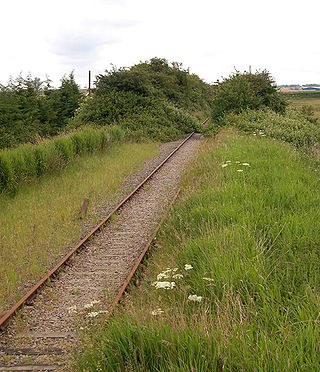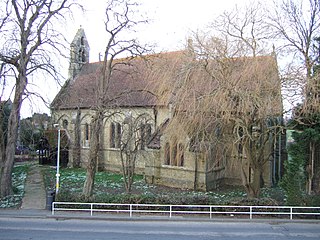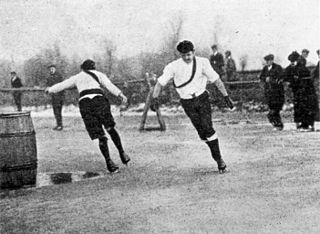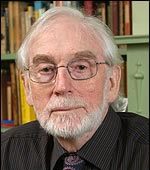
Cambridgeshire is a ceremonial county in the East of England. It is bordered by Lincolnshire to the north, Norfolk to the north-east, Suffolk to the east, Essex and Hertfordshire to the south, and Bedfordshire and Northamptonshire to the west. The largest settlement is the city of Peterborough, and the city of Cambridge is the county town.

The Fens or Fenlands in eastern England are a naturally marshy region supporting a rich ecology and numerous species. Most of the fens were drained centuries ago, resulting in a flat, dry, low-lying agricultural region supported by a system of drainage channels and man-made rivers and automated pumping stations. There have been unintended consequences to this reclamation, as the land level has continued to sink and the dykes have been built higher to protect it from flooding.

Welney is a village and civil parish in the Fens of England and the county of Norfolk. The village is about 10 miles (16 km) south-west of the town of Downham Market, 20 miles (30 km) south of the town of King's Lynn and 45 miles (70 km) west of the city of Norwich. The county boundary with Cambridgeshire is adjacent, with the city of Cambridge 25 miles (40 km) to the south.

Wisbech is a market town, inland port and civil parish in the Fenland district in Cambridgeshire, England. In 2011 it had a population of 31,573. The town lies in the far north-east of Cambridgeshire, bordering Norfolk and only 5 miles (8 km) south of Lincolnshire. The tidal River Nene running through the town is spanned by two road bridges. Wisbech is in the Isle of Ely and has been described as "the Capital of The Fens".

The Isle of Ely is a historic region around the city of Ely in Cambridgeshire, England. Between 1889 and 1965, it formed an administrative county.

Fenland is a local government district in Cambridgeshire, England. It was historically part of the Isle of Ely. The district covers around 500 square kilometres (190 sq mi) of mostly agricultural land in the extremely flat Fens. The council is based in March. Other towns include Chatteris, Whittlesey and Wisbech.

Chatteris is a market town and civil parish in the Fenland district of Cambridgeshire, England, situated in the Fens between Huntingdon, March and Ely. The town is in the North East Cambridgeshire parliamentary constituency.

The Wisbech and March line is a railway line between March and Wisbech in Cambridgeshire, England. A number of proposals are currently being investigated relating to the possible restoration of passenger services along the route.

Thorney is a village in the Peterborough unitary authority in the ceremonial county of Cambridgeshire, England. Located around eight miles (13 km) east of Peterborough city centre, on the A47.

The Diocese of Ely is a Church of England diocese in the Province of Canterbury. It is headed by the Bishop of Ely, who sits at Ely Cathedral in Ely. There is one suffragan (subordinate) bishop, the Bishop of Huntingdon. The diocese now covers the modern ceremonial county of Cambridgeshire and western Norfolk. The diocese was created in 1109 out of part of the Diocese of Lincoln.
Chesterton is a former United Kingdom Parliamentary constituency. It was created upon the splitting up of the three member Cambridgeshire constituency into three single member divisions in 1885. The seat was abolished in 1918 when Cambridgeshire was recreated as a single-member constituency.

Fen Drayton is a small village between Cambridge and St. Ives in Cambridgeshire, England, and between the villages of Fenstanton and Swavesey.

Guyhirn is a village near the town of Wisbech in Cambridgeshire, England. It is on the northern bank, the North Brink, of the River Nene, at the junction of the A141 with the A47. The population is included in the civil parish of Wisbech St Mary. It is notable chiefly for the Chapel of Ease, a rare example of church architecture of the Interregnum (1649–1660), and as a key crossing point of the River Nene.

William "Turkey" Smart was a champion speed skater and the first of a dynasty of skaters from the small village of Welney, on the Norfolk/Cambridgeshire border in the centre of the Fens, England.

Fen skating is a traditional form of ice skating in the Fenland of England. The Fens of East Anglia, with their easily flooded meadows, form an ideal skating terrain. Bone skates have been found in the area dating back to the medieval period.

The Wisbech & Fenland Museum, located in the town of Wisbech in the Isle of Ely, Cambridgeshire, England, is one of the oldest purpose-built museums in the United Kingdom. The museum logo is W&F.

John (Jack) William Gordon was an English writer of young-adult supernatural fiction. He wrote sixteen chlldren's fantasy novels, including The Giant Under the Snow, four short story collections, over fifty short stories, and a teenage memoir.

James Smart (1865–1928) was the youngest brother of George 'Fish' Smart and Jarman Smart. Unlike his brother Fish and uncle Turkey, he always skated under his real name; attempts to call him 'Eagle' to distinguish him from his cousin James Turkey Smart did not stick. He won the professional title of Great Britain in 1890, 1895 and 1900 and the Littleport Cup in 1892. He also won a world championship and a Dutch championship. He was sponsored allowing him to train. Having spent some time training in Norway, he set up an agency to sell Norwegian skates in Britain.
















